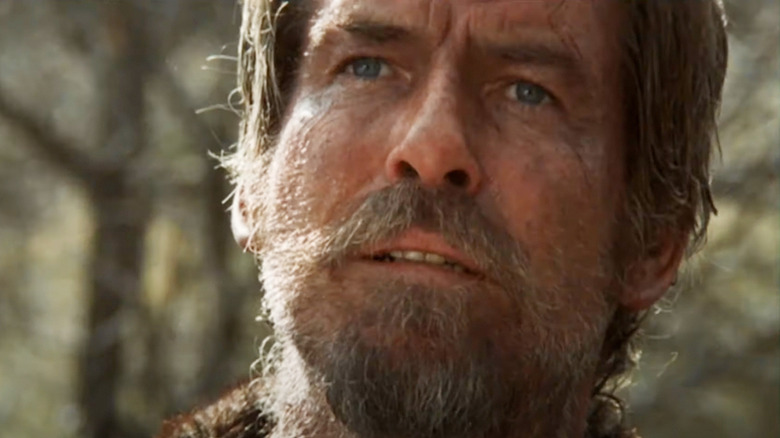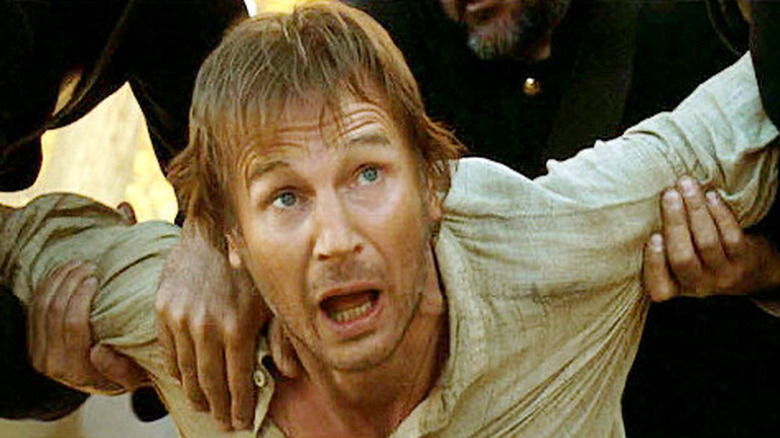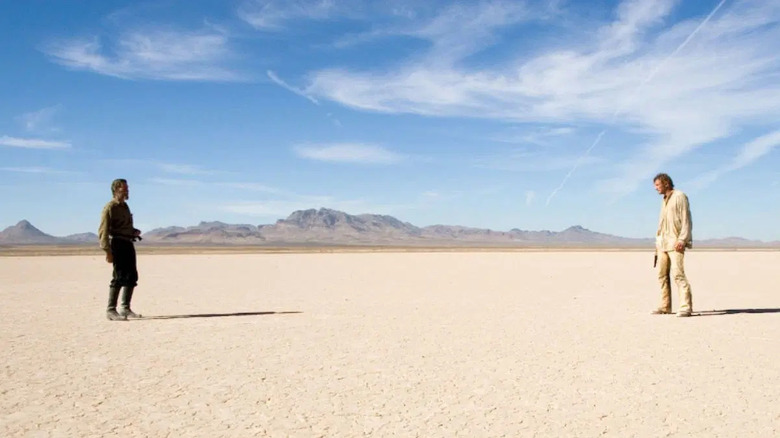Liam Neeson And Pierce Brosnan Starred In A Colossal Western Flop You Never Knew Existed
The Western isn't anywhere near as popular as it once was, but it's never truly disappeared altogether. In fact, in recent years, "Yellowstone" creator Taylor Sheridan has single-handedly fostered somewhat of a Western renaissance with his array of neo-Western TV shows. But even before "Yellowstone" became the massive hit it's known as today, studios continued to release the odd modern oater here and there, and some of them have been quite good.
Indeed, the 21st century boasts more than its share of great Western movies, with 2007 having marked the arrival of one of the finest revisionist Westerns ever in the form of "The Assasination of Jesse James by the Coward Robert Ford" ... though it only got greenlit because Warner Bros. execs thought they were getting a classic shoot-'em-up. Regardless, Andrew Dominik's haunting, elegiac deconstruction of Western tropes and the myth of celebrity was proof that the Western genre still had plenty to offer on the artistic front (Roger Deakins' excellent cinematography also helped a great deal), even though it didn't do very well financially after WB dumped it in five theaters on opening weekend.
Interestingly enough, a film released a year earlier felt like it could have done something similar. But this Liam Neeson and Pierce Brosnan drama just fell short, despite seemingly having all the ingredients necessary for a memorable modern Western. What went wrong? Well, nothing disastrous (aside from the box office), as the film fared okay with critics. Still, there's a reason you haven't heard much about the movie since its release in 2006.
Seraphim Falls was an okay movie that could have been better
"Seraphim Falls" is television producer and director David Von Ancken's first and only feature film. It stars Pierce Brosnan as Gideon, a former Union officer who's on the run from Confederate colonel Morsman Carver (Liam Neeson) at the end of the U.S. Civil War. Carver blames Gideon for a horrific incident during the war in which his wife and children were killed when their house was set on fire. Overcome by the idea of vengeance, Carver will stop at nothing to finally bring Gideon to justice (which, in this case, essentially just means killing him). But while he's clearly seen better days, Gideon remains wily and manages to outsmart his pursuers before Carver inevitably tracks him down and a final showdown unfolds.
Much like "The Assassination of Jesse James," "Seraphim Falls" featured impressive cinematography from John Toll ("Legends of the Fall" and "Braveheart") and dealt with heavy themes of violence, grief, and vengeance. Its two grizzled leads also lent a certain jaded, sorrowful tone to the whole thing, representing as they did two men whose glory years were far behind them. Put simply, "Seraphim Falls" could have been a lot better than it was, but as The Independent's Anthony Quinn wrote of the film, "Von Ancken at times brings his debut very close to something grand and memorable."
The movie premiered at the 2006 Toronto International Film Festival before it received a limited theatrical release in 2007. While initial reactions were solid, "Seraphim Falls" didn't receive the best critical reaction following its theatrical run and ultimately ended up becoming an overlooked entry in the Western canon. Whether you could consider it an underrated Western worthy of your attention will depend on your own tastes, but according to critics, you'll need to prepare for a slow pace and an overriding sense that the film just doesn't realize its full potential.
Critics didn't hate Seraphim Falls
"Seraphim Falls" made $1.2 million during its limited theatrical run. That's on an estimated $18 million budget, which is obviously not what distributor Samuel Goldwyn Films was hoping for. That said, the movie seemed designed from the outset as a direct-to-home-media release, and it likely did quite well on that front, though figures aren't available.
It's really the mixed critical reaction that's most disappointing here. At the time, Liam Neeson had just appeared as the villain Ra's al Ghul in Christopher Nolan's excellent "Batman Begins." Meanwhile, Pierce Brosnan might have departed the James Bond franchise on a sour note with 2002's "Die Another Day" (which is widely considered the worst 007 movie) but seemed primed to remind audiences of his obvious talents by 2006. Alas, a 57% score on Rotten Tomatoes should tell you all you need to know about the film's quality.
Reviewers mostly took issue with the movie's pace and what many folks saw as David Von Ancken's inability to bring anything new to the Western genre. But critics weren't entirely down on the movie, with James Christopher of The Times (UK) finding an "edgy pleasure" in the "sheer brutality of the chase and the bitter struggle to survive the elements." Richard Roeper also enjoyed the film, writing, "Though the chase threatens to go on too long, the suspense remains high because we don't know which man is the real villain, or if there's a villain at all." Others were less forgiving, with the Los Angeles Times' Kevin Crust claiming the film "moves along with minimalist efficiency before running out of gas during an overlong allegorical final section." Meanwhile, Ruthe Stein of the San Francisco Chronicle found it to be "little more than an extended chase scene down a snow-filled mountaintop to a desert floor."
Regardless, nobody had too much of an issue with either Brosnan or Neeson, who did their best to make a middle-of-the-road Western into something more. Critics had different takes on whether they succeeded in that respect, but none were outright hostile to the leading men. Still, the sense that the movie could have been more than it was remains, though it would be interesting to see how it would fare were it released today.


